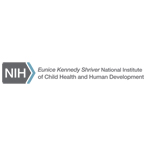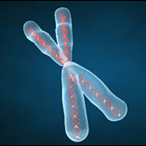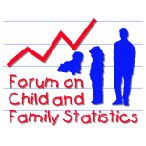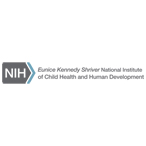A gene that causes a fatal childhood brain disorder can also cause adults to develop peripheral neuropathy, a condition resulting in weakness and decreased sensation in the hands and limbs, according to a study by researchers at the National Institutes of Health and other institutions. The study is the first to show that different mutations in the same gene cause the two seemingly unrelated disorders.
News
NICHD issues News Releases and Media Advisories to the news media. Spotlight and Research Feature articles explain NICHD research findings and public health issues to the general public. An Item of Interest is a short announcement of relevant information, such as a notable staff change.
NIH Appoints Alan Guttmacher Acting Director of NICHD
Alan E. Guttmacher, M.D., is the new acting director of the Eunice Kennedy Shriver National Institute of Child Health and Human Development (NICHD), one of the 27 institutes and centers that comprise the National Institutes of Health.
New NIH Research Plan on Fragile X Syndrome and Associated Disorders
Researchers working for and with support from across the NIH have made significant advances in the understanding of FXS and the associated disorders FXTAS and FXPOI.
Delay in Diagnosis of Menopause-like Condition in Young Women Linked to Low Bone Density
Women and young girls who experience delays in diagnosing a premature, menopause-like condition face increased risk of low bone density, according to new research by scientists at the National Institutes of Health. A delay in diagnosing the condition, called primary ovarian insufficiency, may make women more susceptible to osteoporosis and fractures later in life, the researchers concluded.
Gene Scan Shows Body's Clock Influences Numerous Physical Functions
The pineal gland -- integral to setting the body's sleep and wake cycles -- may be involved in a broad range of bodily functions, according to a study by researchers at the National Institutes of Health and other institutions.
Speaker's Prepared Remarks
National Children’s Study Announcement of Study Launch
NIH Researchers Find That Rett Syndrome Gene Is Full of Surprises
A study funded by the National Institutes of Health (NIH) has transformed scientists' understanding of Rett syndrome, a genetic disorder that causes autistic behavior and other disabling symptoms. Until now, scientists thought that the gene behind Rett syndrome was an "off" switch, or repressor, for other genes. But the new study, published today in Science1, shows that it is an "on" switch for a startlingly large number of genes.
Newly Awarded Autism Centers of Excellence to Further Autism Research
The National Institutes of Health (NIH) announced on April 1, 2008, the latest recipients of the Autism Centers of Excellence (ACE) program. These grants will support studies covering a broad range of autism research areas, including early brain development and functioning, social interactions in infants, rare genetic variants and mutations, associations between autism-related genes and physical traits, possible environmental risk factors and biomarkers, and a potential new medication treatment.
NIH Funds New Program to Investigate Causes & Treatment of Autism
The National Institutes of Health will intensify its efforts to find the causes of autism and identify new treatments for the disorder, through a new research program.
Report Shows Gains, Setbacks for Nation's Children
Compared to national statistics for the previous year, there has been an increase in the percentage of children living with at least one working parent and the percentage of children living in households classified as food insecure has declined. High school students were more likely to have taken advanced academic courses and the percentage of young adults who completed high school has increased. The adolescent birth rate has dropped to a record low.
Boys with Autism, Related Disorders, Have High Levels of Growth Hormones
Boys with autism and autism spectrum disorder had higher levels of hormones involved with growth in comparison to boys who do not have autism, reported researchers from the National Institutes of Health, the Centers for Disease Control and Prevention, the Cincinnati Children's Hospital and the University Of Cincinnati College Of Medicine.
Researchers Discover Gene For Rare Skin Disorder
Researchers funded in part by the National Institutes of Health have identified the gene that accounts for most cases of Goltz syndrome, a rare skin disorder that can also affect bone and eye development.
Largest-ever Search for Autism Genes Reveals New Clues
The largest search for autism genes to date, funded in part by the National Institutes of Health (NIH), has implicated components of the brain's glutamate chemical messenger system and a previously overlooked site on chromosome 11.
Brain's Fear Center Shrinks in Autism's Most Severely Socially-Impaired
The brain's fear hub Likely becomes abnormally small in the most severely socially impaired males with autism spectrum disorders, researchers funded by the National Institutes of Health's (NIH) National Institute of Mental Health (NIMH) and National Institute on Child Health and Human Development (NICHD) have discovered.
An Ending and a Beginning: Landmark Research Network Concludes
When autism was first named in 1943 by Dr. Leo Kanner, it was thought to be a rare condition, occurring in fewer than three children in 10,000. By 1996, the estimated incidence of autism was about 12 cases per 10,000 children—not exactly the rate of a rare disorder.
Gene Linked to Autism in Families with More Than One Affected Child
A version of a gene has been linked to autism in families that have more than one child with the disorder. Inheriting two copies of this version more than doubled a child's risk of developing an autism spectrum disorder, scientists supported by the National Institutes of Health's (NIH) National Institute of Mental Health (NIMH) and Eunice Kennedy Shriver National Institute of Child Health and Human Development (NICHD) have discovered.
Study Provides Evidence that Autism Affects Functioning of Entire Brain Previous View Held Autism Limited to Communication, Social Behavior, & Reasoning
A recent study provides evidence that autism affects the functioning of virtually the entire brain, and is not limited to the brain areas involved with social interactions, communication behaviors, and reasoning abilities, as had been previously thought. The study, conducted by scientists in a research network supported by the National Institutes of Health (NIH), found that autism also affects a broad array of skills and abilities, including those involved with sensory perception, movement, and memory.
Researchers Gain Insight into Why Brain Areas Fail to Work Together in Autism
Researchers have found in two studies that autism may involve a lack of connections and coordination in separate areas of the brain.
Brains of People with Autism Recall Letters of the Alphabet in Brain Areas Dealing With Shapes
In contrast to people who do not have autism, people with autism remember letters of the alphabet in a part of the brain that ordinarily processes shapes, according to a study from a collaborative program of the Eunice Kennedy Shriver National Institute of Child Health and Human Development of the National Institutes of Health.
Mouse With Rett Syndrome May Provide Model for Testing Treatments, Understanding Disorder
Scientists funded by the Eunice Kennedy Shriver National Institute of Child Health and Human Development (NICHD) have developed a new mouse model for Rett syndrome - a heartbreaking disorder which gradually robs apparently healthy infants of their language, mental functioning, and ability to interact with others.
 BACK TO TOP
BACK TO TOP



